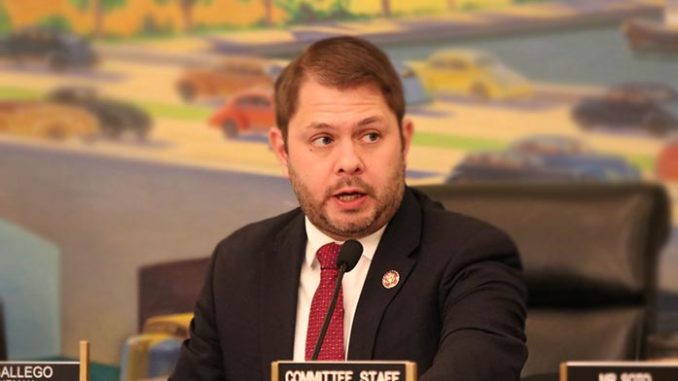
Rep. Ruben Gallego is putting a heavy spin on drug-related deaths, implying they were caused by the heat in order to shill for his $30 million pet projects bill.
Federal funding for more municipal pet projects like artificial shade structures, tree planting, or “cooling stations” won’t stop the leading single cause of heat-associated deaths: drug overdoses.
There have been 289 confirmed heat-associated deaths this year: 149 have been determined heat-caused, and 140 have been determined heat-related. Another 262 deaths remain under investigation.
It’s clear from previous years’ reports that substance abuse will likely make up the majority of heat-associated deaths. In 2022, 67 percent of the 425 heat-associated deaths involved substance use; 81 percent involved drugs only, with over half of those deaths involving meth.
In 2021, 60 percent of the 339 heat-associated deaths involved substance abuse. In 2020, 58 percent of the 323 heat-associated deaths involved substance abuse. In 2019, 47 percent of the 197 heat-associated deaths involved substance abuse. In 2018, 50 percent of 182 heat-associated deaths involved substance abuse.
The rise in heat-associated deaths, with a greater majority growing to involve substance abuse, shares a positive correlation with the homeless population increase following the 2018 election of Phoenix Mayor Kate Gallego that, ultimately, manifested into the Zone.
There was at least a 36 percent increase in homeless individuals from 2019 to 2022, according to the Maricopa Association of Governments Point-in-Time Count.
Just last week, the Maricopa County Superior Court ruled that the city of Phoenix had not only allowed but facilitated “the Zone,” that notorious homeless encampment downtown. Judge Scott Blaney gave the city until Nov. 4 to clean it up.
It may be too late for this year, but the ruling’s impact on heat-associated deaths may become evident through next year’s tally of heat-associated deaths, should the city of Phoenix abide by the ruling.
So far this year, the homeless make up 44 percent of the deaths; those with unknown living situations make up 10 percent.
Apart from drug use, the homeless have increasingly been the largest single population making up heat-associated deaths. Last year, 178 of the deceased were homeless, with 105 others declared to have unknown living conditions. Half of those homeless deaths involved substance abuse.
It appears that Rep. Gallego either fails to see or continues to ignore the correlation between his ex-wife’s election as mayor, the increased homeless population, and the spike in heat-associated deaths with substance abuse involved. Rather than encouraging a change in policy from members of his own party, Gallego believes more funding would be the answer.
His Excess Urban Heat Mitigation Act would create a $30 million federal grant program with at least 75 percent of funding eligibility restricted to census tracts with poverty rates of 20 percent or more.
The federal government can and must step up to help prevent these tragic deaths. It’s time for Congress to pass my Urban Heat Mitigation Act to keep cities cool and people safe.https://t.co/8UOSUYMVyH
— Ruben Gallego (@RepRubenGallego) September 25, 2023
Plans that would qualify for funding would not only include those which offer heat relief, but those which explain their commitment to diversity, equity, and inclusion; intersectionality between human health, environment, and built environment; “meaningful, reciprocal relationships with community-based organizations;” and community participation.
The Office of Community Planning and Development would coordinate with the Environmental Protection Agency (EPA), Forest Service, and National Oceanic and Atmospheric Administration Climate Program Office to run the grant program.
The grant-making team would also include a board with members from the EPA and its Heat Island Reduction Program, Department of Health and Human Services and its Office of Climate Change and Health Equity, Department of Energy and its Office of Energy Efficiency and Renewable Energy, and the Department of Agriculture and its Urban and Community Forestry Program.
